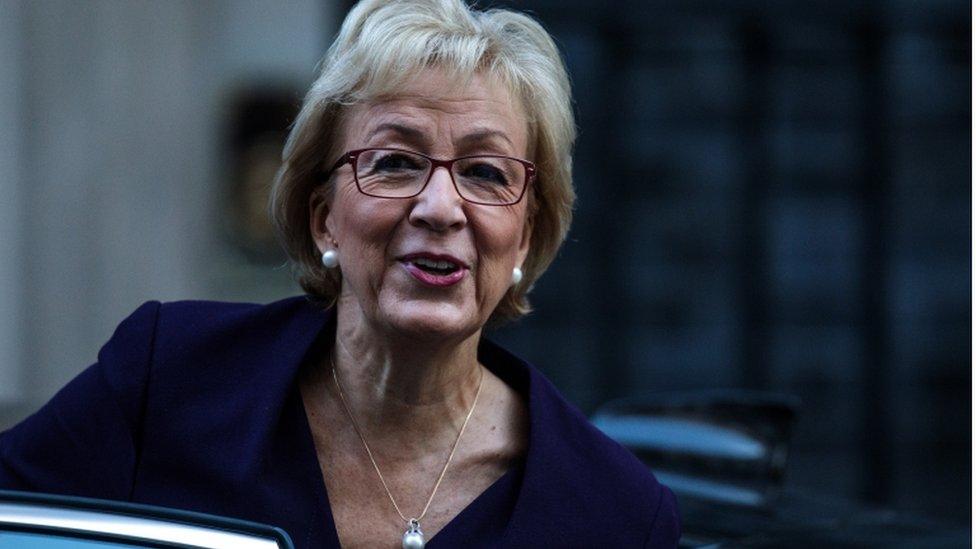Brexit: UK must not be trapped in backstop, Leadsom says
- Published

Mrs Leadsom was a prominent Brexit campaigner
Any Brexit deal negotiated with the EU must not "trap" the UK in a customs arrangement it cannot choose to leave, Andrea Leadsom has told the BBC.
The Brexiteer minister urged Tories to back the PM and said she was "sticking in government" to work for a good deal.
But the UK must not be "held against its will" in any "backstop" aimed at avoiding a hard Irish border, she said.
On Friday, pro-Remain minister Jo Johnson quit the government and called for a new referendum on the final deal.
Asked if other ministers might resign, Commons leader Mrs Leadsom told BBC 5 live's Pienaar's Politics she was not expecting any, adding: "I do urge colleagues to support the prime minister.
"We are at a very difficult stage. What we have to do is hold our nerve and keep negotiating, make sure that we are pointing out to our EU friends and neighbours that it's in all of our interests to get a good deal."
The government has not yet agreed a withdrawal deal with the European Union, ahead of the UK's scheduled exit from the bloc next March.
While it says a deal is 95% agreed, they have been unable to agree on a legally binding mechanism for ensuring that there will be no return to border checks between Northern Ireland and the Irish Republic, if a future trade deal is not ready in time.
Earlier shadow foreign secretary Emily Thornberry told the BBC "all options remain on the table", including another referendum, if a Brexit deal was voted down in the Commons.
Mrs Leadsom, who Theresa May beat to the Conservative leadership in 2016, said there would not be another referendum if MPs rejected the final withdrawal deal.
But she said she believed "most members of Parliament would vote for a deal rather than no deal".
Confused by Brexit jargon? Reality Check unpacks the basics.
If sufficient progress is made on the "backstop" it is thought a special cabinet meeting could be held next week for ministers to approve the draft agreement on the terms of the UK's exit.
One option is for the whole of the UK to remain temporarily aligned to the EU's customs union, avoiding the need for customs checks at the border until a free trade deal is ready.
But Leave campaigners want a clear exit strategy from any such arrangement - while the EU says any "backstop" must apply "unless and until" it is no longer needed.

Red lines
By BBC political correspondent Jessica Parker
MPs on all sides are readily setting out their conditions and caveats when it comes to a potential Brexit deal.
And while Andrea Leadsom made it clear that she still supports Prime Minister Theresa May, there was a hint too that she has her own red lines, saying that the UK must not end up trapped in an EU customs arrangement.
This plays into wider fears in some Conservative quarters that Mrs May could end up accepting a compromise too far on the "backstop" issue, in order to get a withdrawal agreement with the EU over the line.

Mrs Leadsom said while the backstop was not a "likely scenario" - because she believed a trade deal could be reached before it would be necessary - it must be "time limited" and "include the entire UK", rather than just Northern Ireland. And the UK must be able to decide to leave it - without the EU overturning that decision.
She added: "The UK cannot be forced to remain in a customs arrangement. Now how that specifically works is exactly what is being discussed and negotiated on now. The UK cannot be held against its will in a customs arrangement."
'Too hard a line'
Earlier Education Secretary Damian Hinds said: "If you have too hard a line about saying, 'Well we must just have a totally unilateral exit, or there's an absolutely fixed, hard end date,' that is... very, very unlikely that is going to be negotiable with the other side.
"On the other hand, people here rightly want comfort and they should be able to have comfort and confidence that it isn't an open-ended thing."
Meanwhile, General Sir Nick Carter, chief of the defence staff, was asked on the BBC's Andrew Marr Show what the military might be called on to do, in the event the UK leaves the EU with no withdrawal deal in place, saying "we stand ready to help in any way we can".
Defence minister Tobias Ellwood told Sky News the government had to plan for every scenario adding: "There are contingency plans being made, there are discussions being held behind the scenes as to what support our armed forces will do."
Brexit is due to happen on 29 March 2019, as a result of the referendum in June 2016 in which people voted by 51.9% to 48.1% for the UK to leave the European Union.
If a Brexit deal is agreed between the UK and the EU, it then has to be approved by the House of Commons and the remaining EU member states.